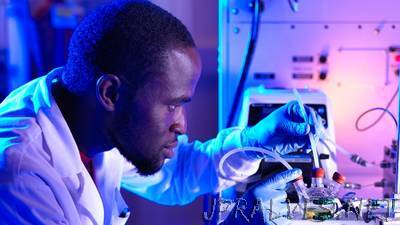
“Masdar Institute researchers have engineered a novel non-aqueous low-cost flow battery equipped with fast-charging that is able to charge itself in half the time it would normally take, which they believe may enable cheaper and more efficient large-scale renewable energy storage. The prototype battery has an open-circuit voltage of 1.2 volts, with an extra voltage of 1.8 volts leveraged for rapid charging. The device is the first such non-aqueous redox flow battery to employ the unique fast-charging design, cutting the amount of time it takes to fully charge by up to 50%. “Non-aqueous redox flow batteries have the potential to store more energy than aqueous-based systems, because organic solvents have a wider voltage window than that of water; which allows for formulation of battery chemistries with higher open-circuit voltages. But due to other challenges, their performance has not yet reached the levels achieved by their water-based counterparts,” explained Musbaudeen Bamgbopa, a PhD student at MI. He believes that a major opportunity for non-aqueous flow batteries – which are a type of flow battery that utilize solvents other than water – is for scientists to expand their focus on performance improvement beyond a narrow focus on increasing energy density. Bamgbopa and his advisor, Dr. Saif Almheiri, Assistant Professor of Mechanical and Materials Engineering, realized that there was another way to capitalize on the wide voltage window of non-aqueous flow batteries. “What we did in our work is present another advantage of the non-aqueous based redox flow system that scientists have overlooked. Instead of trying to increase our battery’s energy density, we used that extra allowable voltage for fast-charging,” Dr. Almheiri shared. The MI researchers published their results in a paper earlier this month in the Journal of Materials Chemistry A.”
